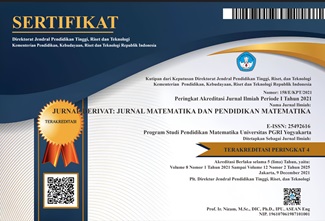Resiliensi dan Disposisi Matematis Mahasiswa Pendidikan Matematika
DOI:
https://doi.org/10.31316/jderivat.v10i3.5096Abstract
Disposisi dan resiliensi matematis mempunyai peran penting dalam pembelajaran matematika. Penelitian ini bertujuan untuk mendeskripsikan disposisi matematis dan resiliensi matematis mahasiswa pendidikan matematika dan korelasinya. Sampel pada penelitian yaitu mahasiswa program studi pendidikan matematika semester 4 yang berjumlah 114 orang diambil secara acak. Hasil penelitian menunjukkan bahwa skor disposisi dan resiliensi matematis mahasiswa masuk dalam golongan sedang. Dari hasil analisis korelasional menunjukkan bahwa terdapat korelasi yang lemah antar kedua variabel. Untuk hasil regresi diperoleh nilai sig kurang dari 0,05 maka secara regresi dapat diketahui terdapat pengaruh antara variabel disposisi dan resiliensi matematis.
References
Ariyanto, L. et al .2017. Developing Mathematical Resilience of Prospective Math Teacher. J. Phys.: Conf. Ser. 895 012062. Diunduh pada pdf (iop.org) tanggal 24 Juni 2023.
Hakim, A. R. 2019. Menumbuhkembangkan Kemampuan Disposisi Siswa dalam Pembelajaran Matematika. Prosiding Diskusi Panel Nasional Pendidikan Matematika. Vol 5
Hartati, L. 2013. Pengaruh gaya Belajar dan Sikap Siswa pada Pelajaran Matematika Terhadap hasil Belajar Matematika. Formatif: Jurnal Ilmiah Pendidikan MIPA. Vol 3, No 3.
Hastaruddin. 2008. Permasalahan Pembelajaran Matematika Sekolah dan Alternatif Pemecahannya. Pythagoras: Jurnal Matematika Pendidikan Matematika. Vol 4, No 1.
Johnston-Wilder, Sue and Lee, Clare (2010). Developing mathematical resilience. In: BERA Annual Conference 2010, 1-4 Sep 2010, University of Warwick
Kilpatrick, J., Swafford, J & Findell, B. 2001. Adding It Up: Helping Children Learn Mathematic. National Academy Press, Washington DC.
Kurniawan, A., & Kadarisma, G. 2020. Pengaruh Disposisi Matematis terhadap Kemampuan Pemecahan Masalah Matematika Siswa SMP. JPMI: Jurnal Pembelajaran Matematika Inovatif, 3(2), 99-108.
Lee, C. & Penny, R. W. (2022) Agency and fidelity in primary teachers’ efforts to develop mathematical resilience, Teacher Development, 26:1, 75-93.
NCTM. 1999. Glenda Lappan: Fostering a Good Mathematical Disposition. NCTM News Bulletin.
Permatasari, K.G. 2021. Problematika Pembelajaran Matematika di Sekolah Dasar/Madrasah Ibtidaiyah. Journal Pedagogy. Vol 14, No 2.
Rahmah, Nur. 2013. Hakikat Pendidikan Matematika. Al Khwarizmi: Jurnal Pendidikan Matematika dan Ilmu Pengetahuan Alam. Vol.1 (2), 1-10.
Sumarmo, U. (2013). Pengembangan Kemampuan dan Disposisi Berpikir Kritis dan Kreatif Peserta Didik Dalam Pembelajaran Matematika. Kumpulan Makalah: Berpikir dan Disposisi Matematika Serta Pembelajarannya. Jurusan Pendidikan Matematika, UPI.
Sumarmo, U. (2013). Mathematical Creativity and Disposition. Kumpulan Makalah: Berpikir dan Disposisi Matematika Serta Pembelajarannya. Jurusan Pendidikan Matematika, UPI.
Supriatna, A & Zulkarnaen, R. 2020. Studi Kasus Tingkat Kecemasan Matematis Siswa. Prosiding Sesiomadika. Vol 2, No 1c.
Siegel, H. 1999. What (Good) Are thinking Disposition? Journal Educational Theory. Vol.49 (2), 207-222.
Kooken, Janice; Welsh, Megan E.; Mccoach, D. Betsy; Johnson-Wilder, Sue and Lee, Clare (2013). Measuring mathematical resilience: an application of the construct of resilience to the study of mathematics. In: American Educational Research Association (AERA) 2013 Annual Meeting: Education and Poverty: Theory, Research, Policy and Praxis, 27 Apr - 1 May 2013, San Francisco, CA, USA.
Uyun, Z. 2012. Resiliensi dalam Pendidikan Karakter. Prosiding Seminar Nasional Psikologi Islami. Hal 200-208
Xenofontos,C & Mouroutsou, S. 2022. Resilience in Mathematics education research: a systematic review of empirical studies. Scandinavian Jounal of educational Research
Downloads
Published
Issue
Section
Citation Check
License
Copyright (c) 2023 Retariandalas Retariandalas

This work is licensed under a Creative Commons Attribution-ShareAlike 4.0 International License.
Authors who publish with this journal agree to the following terms:
-
Authors retain copyright and grant the journal right of first publication with the work simultaneously licensed under a Creative Commons Attribution-ShareAlike 4.0 International License that allows others to share the work with an acknowledgment of the work's authorship and initial publication in this journal.
- Authors are able to enter into separate, additional contractual arrangements for the non-exclusive distribution of the journal's published version of the work (e.g., post it to an institutional repository or publish it in a book), with an acknowledgment of its initial publication in this journal.
- Authors are permitted and encouraged to post their work online (e.g., in institutional repositories or on their website) prior to and during the submission process, as it can lead to productive exchanges, as well as earlier and greater citation of published work (See The Effect of Open Access).







